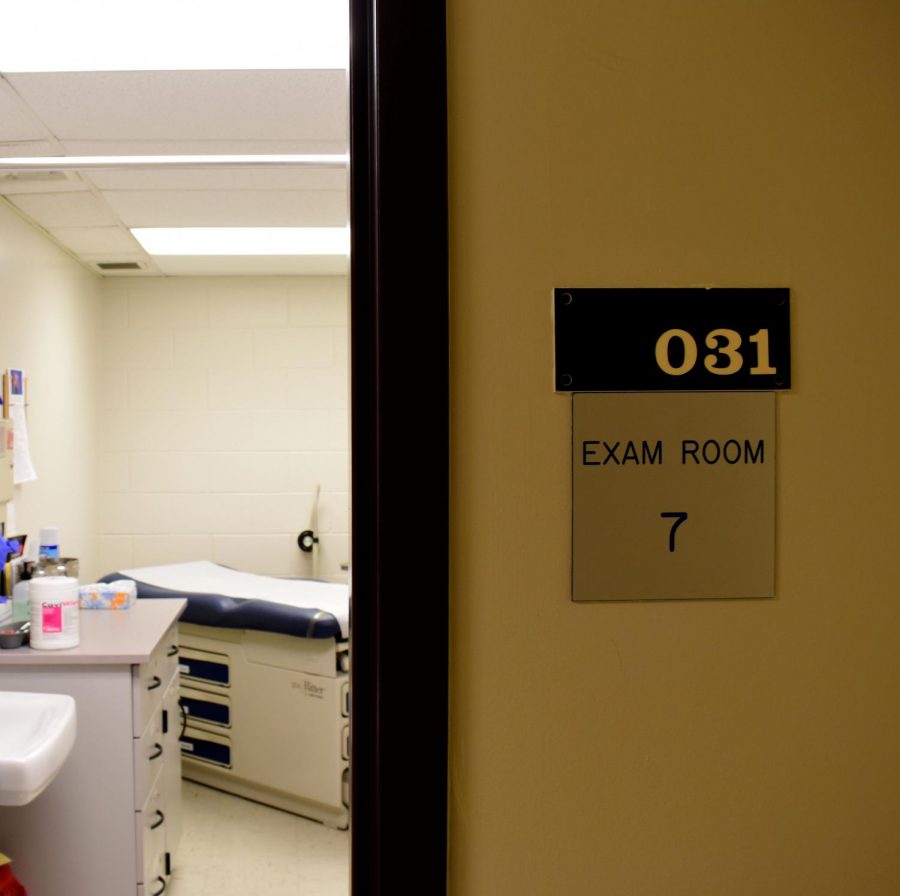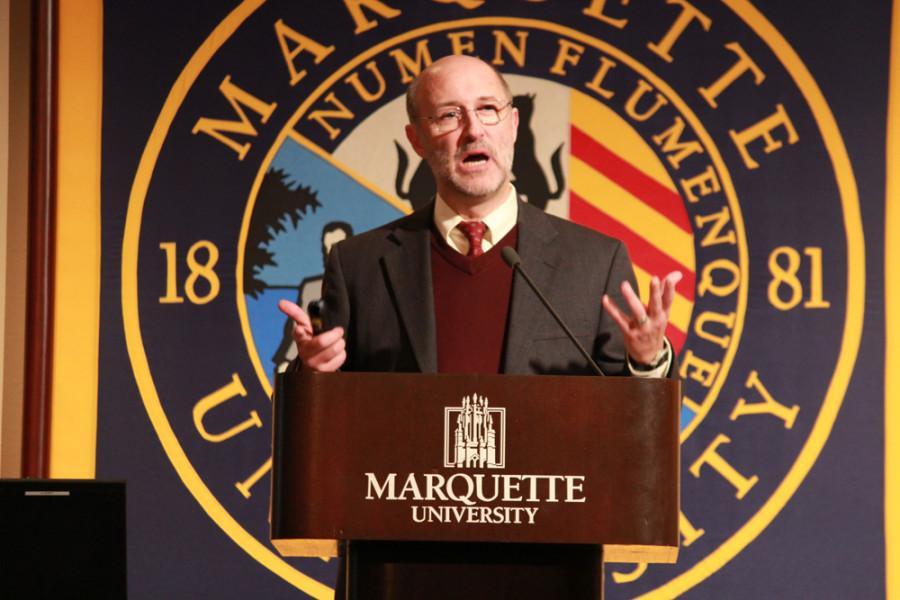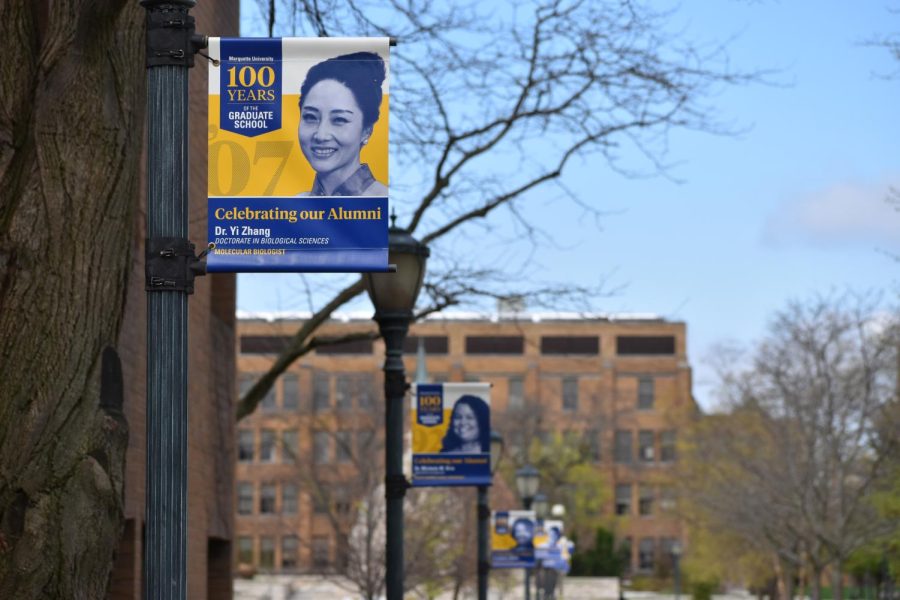Marquette University does not have a voluntary student health insurance plan, according to the university’s website, leaving significant impacts for graduate students.
In the past, the university did offer a voluntary student health insurance plan. However, based on previous versions of the university’s website, this ended during the 2015-16 school year.

Photo courtesy of the Wayback Machine
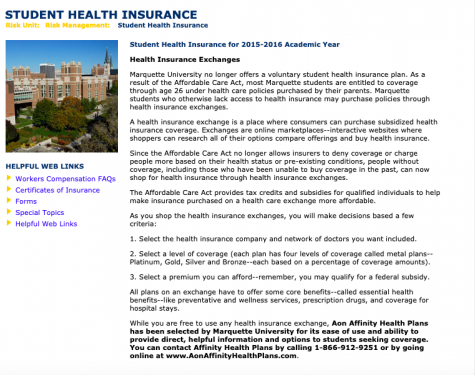
Photo courtesy of the Wayback Machine
According to the current website, students at Marquette are entitled coverage from their parents under the Affordable Care Act until they are 26.
The Affordable Care Act is a health reform law passed in 2010 by then-President Barack Obama with the goal of increasing availability of affordable health insurance, according to the U.S. Department of Health and Human Services.
The website states that students who are not covered under the Affordable Care Act may purchase policies through health care exchanges. A health insurance exchange is where consumers can purchase subsidized health insurance, such as online marketplaces, according to the university website.
Marquette does offer a resource for possible health insurance for students not covered by other insurance on its website. The Wisconsin Association of Independent Colleges and Universities offers health insurance through Wisconsin Physicians Service, a health insurance company based in Madison, Wisconsin.
The university’s website previously stated that graduate assistant health insurance was no longer offered. However, the website removed that line some time after September 2019, the last time it can be seen on the page based on recorded archives. University spokesperson Chris Stolarski said he did not know why the change occurred, and the Office of Marketing and Communication was not responsible for that page.
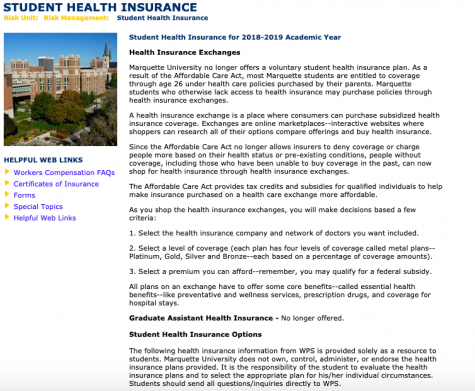
Photo courtesy of Wayback Machine
Matthew Paulus, director of risk management, the department that oversees the webpage concerning health insurance for students, said they made updates to remove outdated information. He also said graduate assistant insurance is offered through WAICU.
However, the university website states regarding WAICU that “Marquette University does not own, control, administer, or endorse the health insurance plans provided.”
The university also offered graduate assistant health insurance until the 2017-18 school year, according to a previous version of the university’s website.
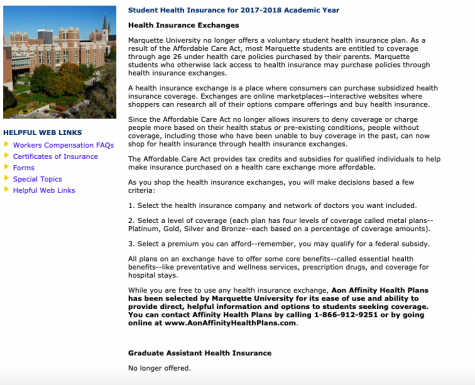
Photo courtesy of Wayback Machine
Although the university does not offer health insurance to most students, it does require health insurance for international students, according to the university’s website. This insurance is offered through UnitedHealthcare.
A faculty member who requested anonymity because they are untenured, provided multiple examples they had heard secondhand regarding graduate students’ difficulties concerning lack of insurance. These included a diabetic graduate student being forced to purchase insulin from eBay or a similar website due to lack of coverage, and another graduate student having to choose between insuring themselves or their child.
The faculty member said because they had heard about it secondhand, they could not verify whether these examples were true. Sebastian Luft, a professor of philosophy, confirmed the diabetic graduate student’s difficulties.
Sarah Kizuk, a fifth-year student in the graduate school, is an international student from Canada and therefore is required to have insurance. She said she is frustrated that she is offered insurance while her peers are not.
She said her health insurance through the university is decent and costs her about $2,000 a year.
Kizuk said she has seen people in her department being sick the entire semester and not being able to do anything about it due to a lack of insurance. She also said she had a friend who had an illness but did not take required medication due to the price without insurance.
She said these issues affect the quality of life of graduate students and can negatively impact their work and teaching.
“It’s not just this issue of people not being able to afford things, but being able to have a life that makes them not only have a good life in their own personal way but be the best kind of employee they can,” Kizuk said.
A second anonymous faculty member said that the stress of being a graduate student makes the students very vulnerable and in particular need of health care.
“When you are working 50, 60, 70 hours a week on research, it’s extremely stressful,” they said. They said this can lead to mental health issues among graduate students.
The second faculty member expressed concern over Marquette’s status as a research institution due to the lack of health insurance.
They said for the university to keep its high national ranking, they rely on graduate students. According to U.S. News and World report, Marquette is ranked 84th in best colleges. U.S. News bases its rankings on student outcomes, faculty resources, expert opinion, financial resources, student excellence and alumni giving, according to its website. It is unclear whether research is included in one of those categories.
“Students come to schools because of rankings,” they said, adding that it is unreasonable to expect graduate students to put in a lot of work to benefit the university’s rankings without providing health insurance to them.
Michelle Mynlieff, chair of biological sciences, echoed that sentiment.
“The specific impact of not having healthcare for graduate students is in recruiting,” Mynlieff said in an email. “We are competing for the best students with other universities that do have healthcare insurance while we do not.”
Luft said he felt concerned about the lack of health insurance as well and said that he, among others, have lobbied for years to see change in this regard.
He said last year the university lost a prospective graduate student who declined to come to Marquette due to health concerns. He said this was a waste of resources for Marquette, as money was spent to bring him to visit campus and talk to numerous faculty and peers.
The first faculty member said they personally are concerned about sending students into research fields that are possibly dangerous without health insurance, such as situations regarding biology.
When Marquette is recruiting non-traditional groups, such as people from older populations not on insurance, the first faculty member said health insurance is a large concern.
The university recently laid off 2.5% of employees, leaving 49 vacancies. This was a part of a cost-management review process and the university’s attempt to address financial and demographic challenges affecting the higher education industry, as University President Michael Lovell expressed in an August letter to faculty and staff.
The number of college-aged students is expected to decline by 15% to 25% beginning in 2026, which Lovell said is noted in the book “Demographics and the Demand for Higher Education” by Nathan Grawe. The decline is attributed to fewer births after the 2008 economic recession.
These challenges may lead to the university’s increased recruitment of non-traditional areas.
The first faculty member said they felt that it is the responsibility of any university to provide this support.
“We advocate social responsibility and taking care of the well-being of others — how can we not offer health insurance to students who need it?” the first faculty member said.
“I think it would be true to say that I think the university’s failure to provide graduate students with healthcare is both a moral failure and out of line with Catholic values,” Robert Riordan, a graduate assistant of philosophy, said in an email.
Marquette is one of three Jesuit universities to not offer student health insurance, the first faculty member told the Marquette Wire. The two others are Gonzaga University in Washington and Loyola University-New Orleans, the first faculty member said. According to Gonzaga’s website, the university does not offer a school sponsored insurance plan. Loyola University-New Orleans’ website also said it does not have a university sponsored health insurance plan.
The first faculty member said health insurance is about the numbers, and Marquette is large enough to provide health insurance. They said that multiple smaller universities, including University of San Francisco, Fairfield University, Creighton University and Rockhurst University provide health insurance for students.
“If other similarly-sized or smaller universities can provide student health insurance, the question is: how can MU replicate their plans to offer student health insurance?” the first faculty member said in an email.
UnitedHealthcare Student Resources is an organization that builds health insurance plans for universities, according to its website. The first faculty member said they spoke to a former representative of Marquette at UHCSR about health insurance for students at Marquette, discovering some requirements for a student health insurance plans through UHCSR.
The two main requirements, the first faculty member said, include that student health insurance plans must be hard-waiver programs. This means students would automatically be enrolled unless they provided proof of other insurance. The other requirement is known as the “20% rule,” the first faculty member said. This rule assumes that 20% of the student body will enroll in a student health insurance plan. A stable health insurance plan requires 500 members, such that the minimum number of students enrolled must be 2,500.
The first faculty member said the 20% rule has been a major issue preventing student health insurance at Marquette. Historically, for graduate students, health insurance was only offered for those on teaching assistant or research assistant fellowships, the first faculty member said. They said there are about 250 students involved with that, with only 50% not covered under insurance by parents or spouse.
Therefore, their pool would be 125 students, too small for a stable student health insurance plan, the first faculty member said.
However, the graduate school has more than 3,000 students. The first faculty member said they did not know if the school could expand its coverage to all in the graduate school.
Doug Woods, dean of the graduate school, said the Marquette Graduate School Organization surveyed graduate students in 2017-18 and found that 57% of graduate students were covered by insurance through their parents or another source.
The Graduate Student Task Force, a task force to discuss concerns and make policy recommendations to the university, has discussed this issue at length, Woods said. Woods also said any decision regarding altering what is currently offered would require discussion with “stakeholders” from around the university.
The first faculty member told the Marquette Wire that Woods met with graduate students and said the graduate school would not get health insurance unless the university offered a plan for everyone. Woods did not confirm or deny this statement when asked in an email.
Although health insurance is not offered, Woods said the graduate school provides a $750 stipend for graduate students. He said this can be used toward health care costs.
A Jesuit school near Marquette, Loyola University-Chicago, offers a student health insurance plan to all students, the first faculty member said. According to Loyola’s website, both undergraduate and graduate students are required to have health insurance either through the university or waive out.
LUC has taken a top-down administrative approach to health insurance, they said.
The first faculty member proposed a university health insurance program for Marquette, outlining multiple qualities it should contain.
The program would be a single student pool, due to the number necessity. They said this would require a single administrator. The program would also be a hard-waiver program, they said. It could possibly be voluntary, but it would increase premiums and lessen benefits, the first faculty member said.
The plan could also include an administrative fee to help with the costs of maintaining the program, they said.
The first faculty member also suggested that the Graduate School could subsidize this proposed plan. The Graduate School has an annual budget of $400,000 to assist with graduate health care, the first faculty member said. The Marquette Wire was unable to confirm if this is the Graduate School’s budget.
If over half of the students do not require university health insurance due to other means, as established by the 2017-18 survey, the Graduate School could subsidize health insurance for only those students who require it, they said.
LUC’s student health insurance plan costs $3,095 a year. Assuming a similar cost, the Graduate School could subsidize half. This would leave graduate students paying about $1,500 a year for insurance, the first faculty member said.
Last year, there were unionization rallies for non-tenure track faculty and graduate student workers. During these rallies, health insurance was a main priority.
This story makes use of an internet archive known as the Wayback Machine, which provides recorded archives of websites.
This story was written by Annie Mattea. She can be reached at [email protected].

